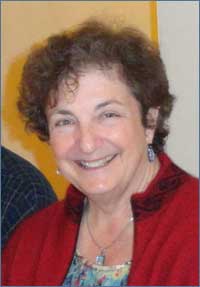Phyllis Katz, Ph.D.

Phyllis has been a part of Project Nexus since its inception. As Executive Director of the Montgomery County Council of PTA's Educational Programs, Inc. Hands on Science (MCCPTA-EPI HOS) and Hands On Science Outreach (HOSO) she brought her perspective to the teacher education process, encouraging the collaboration between the University of Maryland and HOSO. When she retired from the HOS/HOSO programs after 25 years she worked first as a consultant and then as a Research Associate at the University of Maryland on the NSF-funded Project Nexus grant. She has brought her expertise and experience as an informal science educator to the project and has been an integral member of the research team as it has developed its goals, methods and reports. She has brought her use of drawings in HOS/HOSO data collection to Project Nexus as a useful method.
Phyllis has been an active member of the informal science education community in the National Science Teachers Association (NSTA) and the National Association for Research in Science Teaching (NARST). Within NSTA, she advocated for recognition of the work of informal science educators. She was appointed Chair of the Informal Science Advisory Board from 1995-1998. She led the team that wrote the first NSTA Position Statement on Informal Science Education and in 1999 received NSTA's Informal Science Educator award. She has written for and edited NSTA publications, as well as books and articles for adults and children in a variety of other venues. She served on the Advisory Board for the Magic School Bus TV series and worked with Children's Television Workshop on the development of an afterschool component to one of their TV math series. At NARST, she has been part of the informal science education strand since its inception. She has written papers, presented, presided and evaluated proposals. Her research work has been published in peer-reviewed journals.
Phyllis began her career as a teacher in New York City. After returning from a sabbatical year in Toronto and an introduction to informal science education through the Ontario Science Center, she began the HOS program in 1980. This program shortly came under the auspices of the Montgomery County PTA's non-profit after school organization. In 1984, the outreach arm was organized as a separate legal organization to fulfill the growing demand to have afterschool science programs available in other parts of the country. Phyllis wrote her first successful National Science Foundation proposal in 1984 and was awarded funds beginning in 1985. HOSO grew rapidly and received grants/contracts from the U.S. Department of Energy and the U.S. Air Force among others. She wrote manuals for program replication and many articles about the HOS/HOSO programs.
Phyllis' interest in research grew as the afterschool programs expanded. She began to focus on how questions about outcomes could be answered without the methods of school science testing. She was inspired by the use of visual methods, including drawings and photography, as data to support and research the science teaching identity of teacher candidates and the scientist identity development within families.
You can reach Phyllis at pkatz15@gmail.com .

